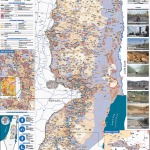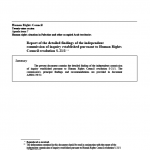
A complex series of concrete walls, electronic fences, and other obstacles to control Palestinian pedestrian and vehicular movement. Palestinian access to land and communities located behind the Barrier is subject to a permit or prior coordination regime. In its 2004 Advisory Opinion, the International Court of Justice (ICJ) established that the sections of the Barrier which run inside the West Bank, including East Jerusalem, together with the associated gate and permit regime, violate Israel’s obligations under international law.

